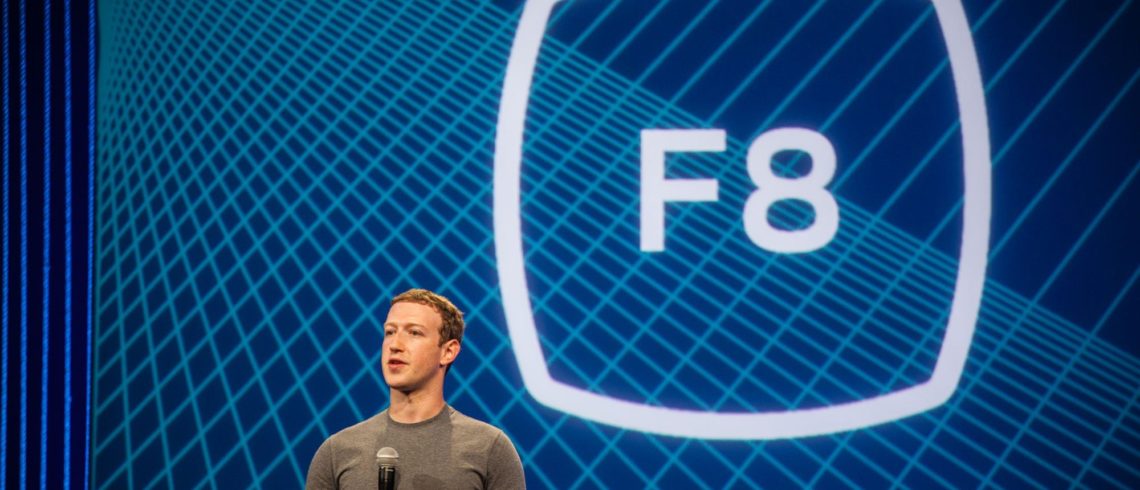On April 18th 2017, Facebook held a conference in San Jose, F8 2017, where numerous topics have been addressed. Facebook had clearly two objectives in mind: first of all, making Messenger as accessible and wide-spread as possible, secondly, becoming a kind of meta-data app. Messenger would then become a sort of hub, in which multiple various systems would find place. These systems can be tchat extensions, which could allow developers integrating bots, app-services, such as Spotify, which can already be used simultaneously by multiple users, personnal AI-based assistants, augmented and virtual reality.
The two latter technologies will respectively be based on an open ecosystem, the first using the smartphone’s camera, while the second one will be based on a virtual social environment, where users will be able to interact via VR. Lastly, Facebook shows their will to innovate by gathering developers in their “Developer Circles”. These shall be open and collaborative, allow developers to share their knowledge, and finally become physical local groups, that organise offline events, in order to coordinate themselves into decentralised offices.
Augmented Reality
- Camera First augmented reality BETA, launched on April 18th.
- Developers will be able to create custom effects
- A use similar to Snapchat’s is the most popular, but other smaller apps will be available. For example : small fishes swimming around your plate.
- Face recognition and tracking technologies integrated
What it means for you:
- You will be able to have integrated augmented reality APIs, available to create your own solution, while having powerful tools ready to use.
- These are currently limited to filters, you will only be able to create them, but not created your own apps. This could change in the future. This feature will be available in Facebook Camera for iOS first and will be made available on Facebook’s other platforms later, such as Messenger, Instagram and WhatsApp under the name of “Facebook Camera Plateform”.
- This kind of augmented reality is way more accessible than the HoloLens, for instance.
Facebook Spaces
Features:
- A whole new app, that allows its users spending time with their friends in VR : a hub, in which each user will use their own VR device.
- The app creates a cartoon version of you, from the various profile pictures you have.
- New ways of interacting with friends other than only via Messenger.
- More information here
What it means for you:
- You can now imagine and envisage new ways of interacting, and create new cases of using virtual reality.
- The automatic avatar creation allows you to showcase this new technology in a fun and entertaining way.
Facebook Messenger
Features:
- A new “Discover” tab, to find bots. In the upcoming weeks, this will be organised in categories and places. This last sorting mode will be beneficial to small local business, which will receive a greater visibility.
- Recently used bots and popular ones will be clearly identified, in order to make searching easier.
- Chat extensions where many people will be able to use third apps simultaneously. A song sent on a group tchat, on Spotify, will be played live by users, who will be able to listen to it in a synchronised manner.
- Group chatbots will be available. Small chatbots can be developed according to specific needs.
- The virtual assistant M, in beta still 2015, evolves. It will be more intelligent, thanks to artificial intelligence, and will give more pertinent and precise suggestions. If the user talks about dinner in a Messenger conversation, M will be able to suggest placing an order via delivery services, such as Deliveroo, for example.
- This new assistant will be available on Messenger, although no release date has been disclosed.
- New improved QR codes, called Messenger Codes, will also be made available. QR codes are very popular in China, notably on WeChat. QR codes are important for enterprises: they can be scanner with a smartphone, and give information to both users and brands. These will be able to track complementary information about the users. Informations such as geographical position and timing will add a phygital layer to the relationship. This will improve your bots’ visibility, as they will be able to be installed by scanning a QR code.
What it means for you:
- Bots create visibility, can be shared easily, while an open usage opens new multi-users experience.
- Chat extensions are also important in the way that they make it able to integrate services for cheaper, as developing times are reduced. Your services will be accessible through an extension only, and will not necessarily need an app.
- The personnal assistant M shows the major place artificial intelligences have in a digital strategy, and the possibility they offer.
- QR codes make it possible for you to make your bots and services viral, and to analyse your targets’ behaviours outside of the internet.
Developer circles
Features:
- These circles are open and free: any developer can become a part of it.
- Local developers means that local and offline events will be organised. Developers will be able to meet on and outside of the internet.
- Increasing the number of developers ready to work on new products gives these new platforms the insurance of having new contents: chat extensions, filters for augmented reality, etc.
- More information available here.
What this means for you:
- These developer circles allow people staying in touch with the latest technological news and on-going Facebook projects.
- They make developing chat extensions easier, and shorten the creative process, alongside with the feedbacks, as they put end-customers and developers in a more direct contact.
Places Graph
Features:
- Free access to data on more than 140 million places around the globe. This goes from public places and parcs to restaurants, shops and other local businesses.
- These datas contain names, addresses, photos, user notes and more.
- Any application will be able to use these datas to create content, while taking account of the geographical position.
- Although access to these datas is free, using them is only possible by paying a fee.
- More information available here.
What this means for you:
- Free datas are always good to have! They give you plenty information about behaviours and customs in each city and type of clients. It becomes easier for you to create topological structures.
- The touristical added-value becomes here obvious: help tourists finding what they want!
New interfaces
- Facebook has been working on new interfaces, one of them being mind control. Current technologies are pretty limitative, as they allow their users to type not by thinking a word, but by moving a cursor around on a virtual keyboard. This gives a rhythm of around 8 words per minute. Facebook hopes to raise that number to the one of 100, to get closer to the oral language fluidity.
- We will not only type, and click on buttons, but completely interact mentally, in order to control a whole machine.
- Hearing for all is one of Facebook’s dreams. The company is currently developing a technology that will allow users to hear through touching, while not needing any implants. New ways of communicating await us!
Other news
- Identity is Facebook’s new API, that allows users connecting their login ID to their Messenger ID, in order to have transparent and fluide interactions between the two.
- Facebook Analytics is a product, freely available, that helps you gathering and measuring behaviours through Facebook’s different channels. It offers a new tool called “automated insight tool”, which uses machine learning to give valuable insights about your users.
- Facebook Workplace becomes free : the current version will become the Standard one, while the original, not free, will become the Premium version.


